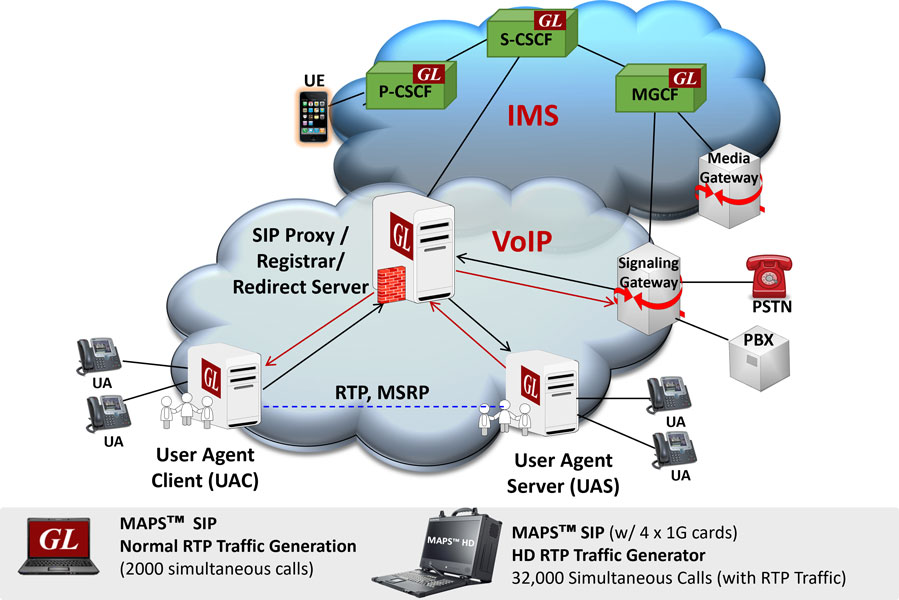GL Enhances SIP Protocol Emulator with EVS and OPUS Audio Codecs
Welcome to another May 2017 issue of GL Communications' Newsletter providing information and insight into our enhanced SIP Protocol Emulator referred to as MAPS™ SIP Protocol Emulator that help user to generate and receive SIP Signaling with traffic. In this newsletter, we are highlighting the important enhancements including EVS and OPUS Audio Codecs introduced to MAPS™ SIP software version 7.5.4.

Overview
GL's Message Automation & Protocol Simulation (MAPS™) designed for SIP testing can simulate User Agents (User Agent Client- UAC, User Agent Server-UAS), Proxy, Redirect, Registrar and Registrant servers. It can be used to simulate any interface of the VoIP network.
Single MAPS™ instance can act as more than one SIP entity at a time and can generate any SIP message on wire in VoIP network and hence equipment needed to test are reduced.
MAPS™ SIP supports UDP, TCP, and TLS transport types. Secure Real-time Transport Protocol (or SRTP) traffic supported over TLS (Transport Layer Security) Transport and TLS Library (OpenSSL) uses a Certificate and Key.
The MAPS™ SIP Conformance Scripts is designed with 300+ test cases, as per SIP specification of ETSI TS 102-027-2 v4.1.1 (2006-07) standard. GL’s MAPS™ SIP is also available in High Density version (requires a special purpose network appliance and PKS109 RTP HD licenses). This is capable of high call intensity (hundreds of calls/sec) and high volume of sustained calls (tens of thousands of simultaneous calls/platform).
Enhancements to MAPS™ SIP Emulator Software
Includes Support for EVS and OPUS Audio Codecs
- Enhanced Voice Services (EVS) is a superwideband speech audio coding standard offers up to 20 kHz audio bandwidth and known for robustness to delay jitter and packet losses due to its channel aware coding and improved packet loss concealment. It has been developed in 3GPP and is described in 3GPP TS 26.441. The EVS codec standard supports sampling rates ranging 8K (Narrowband), 16K (Wideband), 32K (Super-wideband) and 48K (Fullband). The important applications areas of EVS codec are: improved telephony and teleconferencing, audio-visual conferencing services, and streaming audio and more.
- Opus Interactive Audio Codec - Opus is a versatile audio codec standardized by the Internet Engineering Task Force as RFC6716. One of its important applications is in interactive speech and music transmission over the Internet, and it is also used in storage and streaming applications. Opus can also handle a wide range of audio applications that include Voice over IP, videoconferencing, and even remote live music performances. It can be scaled from 6 kbit/s narrowband mono speech to 510 kbit/s fullband stereo music. The codec supports both constant bit rate (CBR) and variable bit rate (VBR) and it provides audio bandwidth such as Narrow Band (8 kHz), Middle Band (12 kHz), Wideband (16 kHz), Super Wideband (24 kHz), and Full Band (48 kHz).
IP Spoofing:
Enhanced MAPS™ SIP application supports "IP Address Spoofing", which helps the user to simulate multiple User Agents each using unique IP (virtual) address within single instance of MAPS SIP.

The virtual IP addresses can be easily added with simple configurations in the ‘UserAgent’ Profiles within the application.
Automate Running Tests for Multiple Iterations:
The call generation feature within MAPS™ SIP is enhanced to control script execution iterations. Now, it is possible to set the selected script within the Call Generation to be executed for the required number of iterations. Gracefully stops the execution of the selected scripts from the point of execution and stops only the current instance allowing the next set of iterations of script execution to continue. Multiple calls can be generated maintaining the inter call duration thus completing the total iterations. Inter Call Duration can be randomized within certain minimum to maximum range in msec.

Different Traffic Support across Simultaneous Calls:
MAPS™ SIP is enhanced to support maximum simultaneous calls with different traffic types. Supported traffic types include the following:
Transmit and detect RTP traffic such as Voice, Video, Fax (T.38), Digits, and Tones (Single and Dual). Live speech can also be transmitted and played back on the call using a headphone and speaker.
Further, IP traffic can be prioritized in the network by configuring DSCP (Differentiated Services Code Point) values in signaling and voice packets.

Auto Call Reject:
MAPS™ SIP also facilitates simulation of failed call scenarios with auto and manual call rejection options. Easy configurations to setup auto call rejection scenario along with the cause for failed calls. Call can be rejected with any of the SIP defined errors like client errors (4XX Failures), server errors (5XX Failures), and global errors (6XX Failures). Some of the example reasons for Request, Server, and Global Failure are -
- Client errors (4XX Failures) - “400 BAD Request”, “402 Payment Required”, “403 Forbidden”, “406 Not Accessible”, “408 Request Timeout”, and many more
- Server errors (5XX Failures) - “501 Not Implemented”, “502 Bad Gateway”, “503 Service unavailable”, “504 Server Timeout”, “505 Version not supported”, “513 Message Too Large”
- Global errors (6XX Failures) - “600 Busy Everywhere”, “603 Decline”, “604 Does not Exist Anywhere”, “606 Not Acceptable”

Supports RTP Session Update during Call:
Provided an option to apply Re-Invite event to update established RTP session with new IP address, Port number, Codec parameters etc.
 Back to Newsletter Index Page
Back to Newsletter Index Page